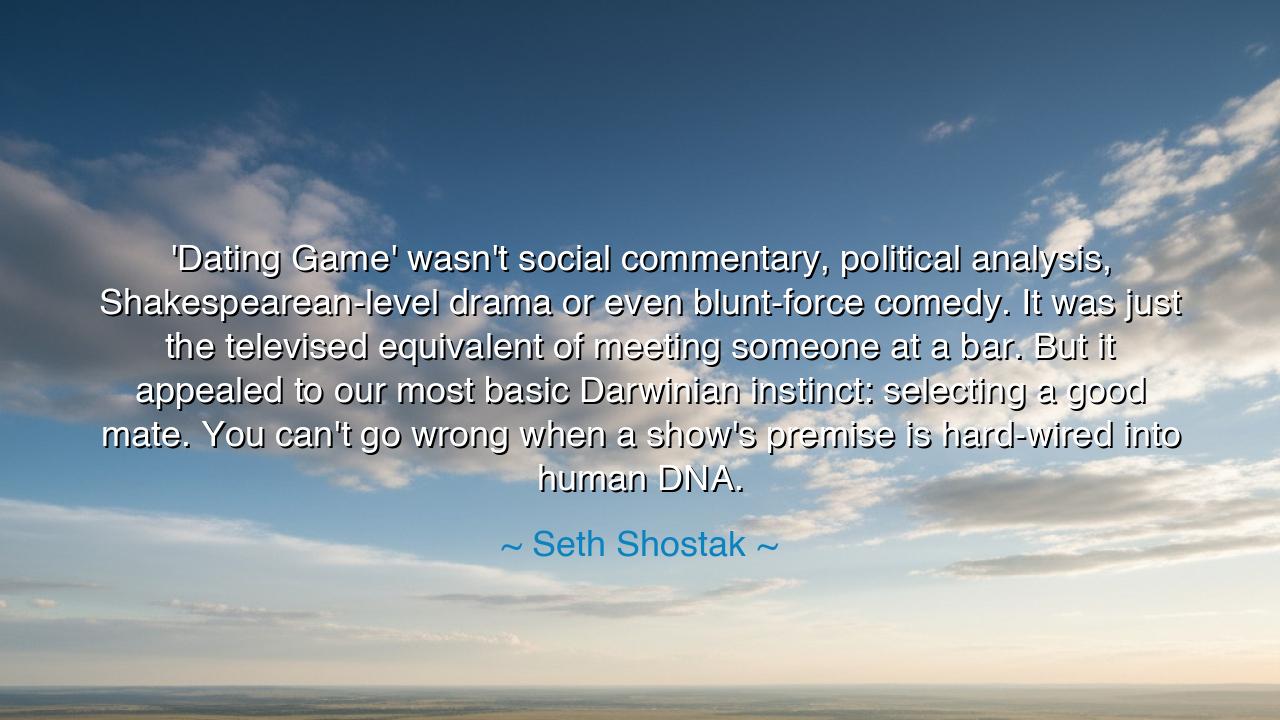
'Dating Game' wasn't social commentary, political analysis
'Dating Game' wasn't social commentary, political analysis, Shakespearean-level drama or even blunt-force comedy. It was just the televised equivalent of meeting someone at a bar. But it appealed to our most basic Darwinian instinct: selecting a good mate. You can't go wrong when a show's premise is hard-wired into human DNA.






In the theaters of light we call television, a candid proverb is spoken: “‘Dating Game’ wasn’t social commentary, political analysis, Shakespearean-level drama or even blunt-force comedy. It was the televised equivalent of meeting someone at a bar. Yet it touched our most basic Darwinian instinct—the choosing of a good mate—and so it flourished, for its premise was hard-wired into human DNA.” Hear the resonance beneath the jest. The show confessed no higher art than courtship, no loftier aim than selection, and precisely there—at the simplest, oldest gate—audiences gathered as around a village well, drawn by the thirst that never leaves a people: the search for another who will stay.
The ancients would have nodded. Long before cameras, the square and the marketplace were living stages where strangers weighed one another in glances and questions: “Whence do you come? What craft is in your hands? Will you keep faith when seasons turn?” The form changes—curtain wall or curtain of sound—but the inquiry endures. To call the program a proxy for meeting at a bar is to say it performed an old rite with new lanterns: proximity, banter, the reading of timbre and wit. Beneath the bright music, biology’s drumbeat kept time.
What the philosopher names telos, the biologist names instinct: continuance, care, the raising of little fires against the dark. Our stories ornament this urge with romance and poetry, but the urge itself is older than speech. The show’s questions were playful, the answers sometimes gaudy, yet the current was serious as winter. Choice—mutual, mysterious, undeniably embodied—was happening in plain sight. When the sage says you cannot go wrong with a premise hard-wired to human DNA, he means that forms succeed when they honor first principles, like boats designed to kiss water rather than defy it.
Consider a parable from the natural world: the satin bowerbird builds an avenue of twigs and decorates it with blue treasures—berries, bottle caps, sky-colored petals. He does not write odes or propose policies; he makes a stage where preference may reveal itself. Females watch, approach, retreat, approach again; choice is enacted, not theorized. So too did ‘Dating Game’ lay out a small bower—three voices, a partition, a thread of questions—so that selection could occur before witnesses. We laughed, but we also recognized ourselves arranging our own twigs—clothes, jokes, posture—hoping to be chosen for something deeper than decoration.
History offers its human analogue. In many towns, harvest dances and saint’s-day fairs served the same verb: gather, behold, choose. A century ago, Ellis Island’s children met in settlement-house socials—no Shakespearean-level drama, only fiddles and shy questions about work and kin, and yet from those evenings came households, businesses, neighborhoods that still breathe. The spectacle was modest; the consequence, generational. The old rites worked because they put two souls within reach of yes. The show did likewise, transmuting a communal ritual into broadcast ritual—imperfect, commercial, and yet unmistakably about us.
The saying also carries a caution: when we call something “just entertainment,” we may miss the sacrament inside the joke. Courtship is never “just.” It steers the river of a people forward. Therefore even a glittering game must be tended with reverence for truth, consent, and dignity—lest the bower become a trap. The deepest amusement is clean; it leaves the participants unharmed, the audience a little wiser about what they are already doing offstage every day.
Take, then, the teaching and its rites. First, in your own seeking, honor the elemental: listen more than you posture; ask questions that reveal values, not only tastes. Second, build bowers that tell the truth—profiles, introductions, and gatherings that illumine rather than disguise. Third, remember that selection is mutual craft: become the kind of good mate you hope to find by practicing steadiness, kindness, and humor when no spotlight is on you. Finally, design your “shows”—dates, parties, even the rooms of your home—to welcome clarity: simple settings, clear intentions, courage enough to accept no and grace enough to receive yes. Do this, and you will find that beneath the neon and the laugh track, the oldest music is playing still—and you will dance to it with open eyes.






AAdministratorAdministrator
Welcome, honored guests. Please leave a comment, we will respond soon